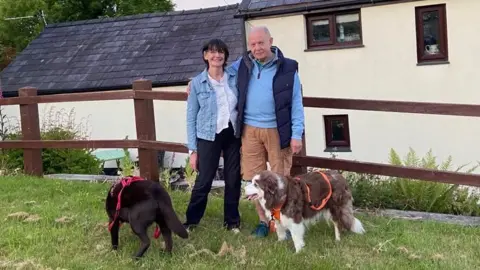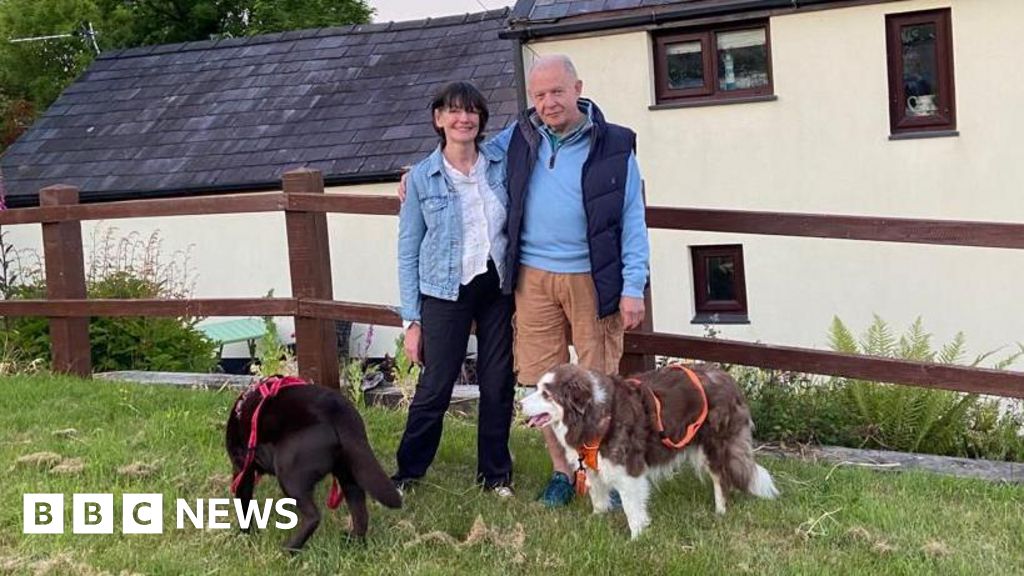 Martyn Hall
Martyn HallA man whose wife died suddenly is unable to recover precious photos of their wedding from her phone in time for her funeral.
Martyn Hall cannot access the iPhone that belonged to his wife, Lynn, because he does not know the passcode.
Apple’s privacy rules mean the contents would be wiped if the code was reset.
Apple says it considers privacy a fundamental human right.
“It’s the one issue that I can’t sort out and I just feel like I’m hitting my head against an absolute brick wall,” Martyn said.
The 64-year-old, from Anglesey, told BBC Radio 4’s You and Yours programme that after Lynn died unexpectedly earlier this month following a brain haemorrhage, he had had no trouble contacting banks and other companies she held accounts with.
But when it came to his 70-year-old wife’s phone – which contains photos of their wedding six years ago and holidays together – things were less straightforward.
“It was either face ID or passcode to open her phone,” he said.
“And obviously I couldn’t do face ID. So it was a question of having a passcode.”
Martyn said because Lynn had also used the phone for her work, he’d never known her code.
Lynn’s funeral takes place in early October.
“We want to do a slideshow at the funeral,” Martyn said.
“And I’d love to be able to access some of those photos to be able to use them for her funeral.
“But I can’t.”
 Martyn Hall
Martyn HallIt is not just their photos, almost all of which were stored on Lynn’s phone, that Martyn wants to recover.
“Lynn was a devout Christian and she also loved music,” he said.
“Obviously I’ve got an idea of one or two, but particularly with the hymns and the Christian songs, I’d love to be able to get into those, to be able to use some of those at her funeral.
“These big parts of her personality, and life, I can’t get access to – and that really upsets me.
“I’m feeling at the moment I’ve got a big hole that I can’t fill with everything that’s stored on that phone.”
As well her photos and music, Martyn said he’d been unable to contact some of Lynn’s friends to tell them she’d died because their details were stored in her phone.
‘Private and secure’
Martyn added even if he did not manage to access his wife’s phone, he wanted to make others aware of the issue.
He said he had been “totally frustrated” with attempts to contact Apple, comparing his experience with other companies that offered a dedicated bereavement service to get Lynn’s affairs in order.
A section on Apple’s website says: “We consider privacy to be a fundamental human right, and our users expect us to help keep their information private and secure at all times. In the unfortunate event of a customer’s death, Apple provides options for their loved ones to request access to or delete their Apple ID and the data stored with it.”
After You and Yours got in touch with Apple, Mr Hall was contacted by their customer relations team, who told him Lynn’s Apple subscriptions would be cancelled – another of the things he was trying to do if he could access her phone.
How can I access a loved one’s phone after they die?
The campaign group Which? said there was no overarching right to someone’s data after their death. But during someone’s lifetime, there are things that can be done to make the process much easier.
Which? tech expert Andrew Laughlin said these differed depending on the company involved. Apple gives users the chance to nominate a legacy contact who could access their data after their death, in the settings menu on their iPhone.
Google, which owns the Android operating system, allows users to set up an inactive account manager who could access their Google services after they die.
Mr Laughlin said many people had no plan for what happens to their digital assets such as photos, emails, and online accounts when they die.
Which? recommends taking steps such as storing photos locally on a USB drive, sharing them on a joint access cloud service, or sharing login details using a password manager tool.


